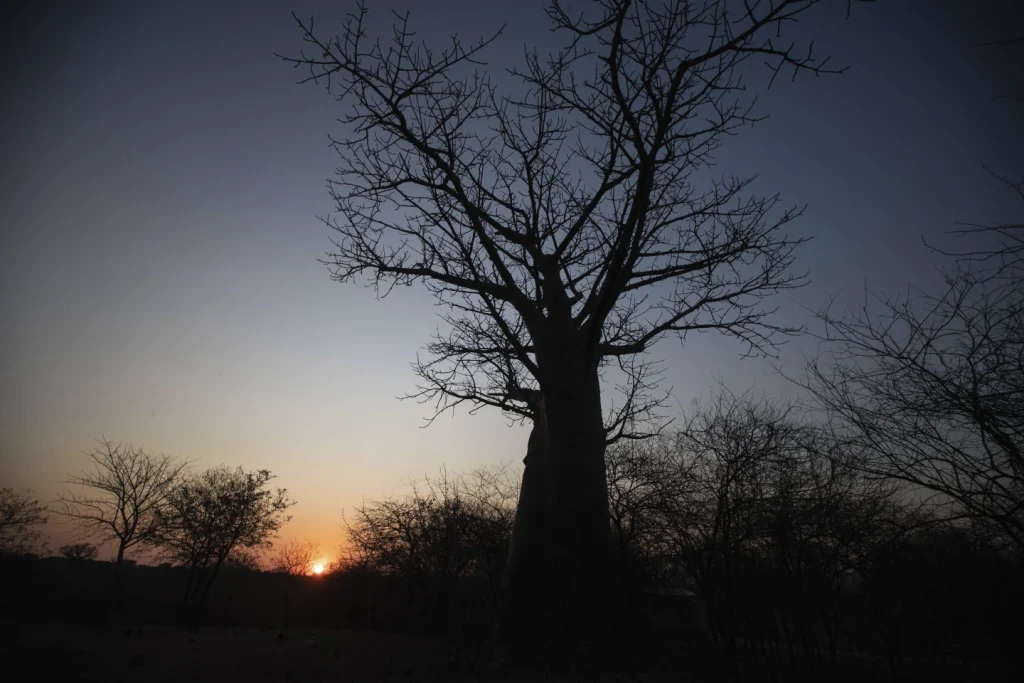
Since youth, Loveness Bhitoni has gathered organic product from the immense baobab trees encompassing her residence in Zimbabwe to change up the family’s staple corn and millet diet. The 50-year-old Bhitoni never considered them to be a wellspring of money, as of not long ago.
Environmental change-actuated dry seasons have crushed her yields. In the interim, the world has a developing craving for the product of the dry spell safe baobab as a characteristic wellbeing food.
Bhitoni wakes before first light to go searching for baobab natural product, strolling shoeless however hot, prickly scenes with the gamble of untamed life assaults. She accumulates sacks of the hard-shelled natural product from the old trees and sells them on to modern food processors or individual purchasers from the city.
The baobab exchange, which flourished in her space in 2018, would already enhance things like youngsters’ school charges and dress for local people of the modest community of Kotwa in northeastern Zimbabwe. Presently, it’s an issue of endurance following the most recent decimating dry spell in southern Africa deteriorated by the El Niño climate peculiarity.
“We are simply ready to purchase corn and salt,” Bhitoni said in the wake of a difficult day’s collect. “Cooking oil is an extravagance, in light of the fact that the cash is essentially sufficiently not. At times I spend a month without purchasing a bar of cleanser. I couldn’t discuss school expenses or youngsters’ garments.”
The worldwide market for baobab items has spiked, turning provincial African regions with an overflow of the trees into source markets. The trees, known for enduring much under serious circumstances like dry spell or fire, need over 20 years to begin creating leafy foods developed however scavenged.
A huge number of provincial individuals like Bhitoni have arisen to take care of the need. The African Baobab Collusion, with individuals across the landmass’ baobab creating nations, projects that beyond what 1 million country African ladies could receive monetary rewards from the organic product, which stays new for extensive stretches in light of its thick shell.
The partnership’s individuals train local people on food handling. They additionally urge individuals to gather the organic product, which can develop to 8 inches (20 centimeters) wide and 21 inches (53 centimeters) in length, starting from the earliest stage than the unsafe work of climbing the gigantic, thick-trunked trees. However, many, particularly men, actually do.
Local to the African mainland, the baobab is known as the “tree of life” for its strength and is found from South Africa to Kenya to Sudan and Senegal. Zimbabwe has around 5 million of the trees, as indicated by Zimtrade, an administration trade organization.
Be that as it may, the baobab’s medical advantages long slipped by everyone’s notice somewhere else.
Gus Le Breton, a trailblazer of the business, recollects the good ‘ol days.
“Baobab didn’t form into a worldwide exchanged and known superfood coincidentally,” said Le Breton, reviewing long periods of administrative, wellbeing and toxicology testing to persuade experts in the European Association and US to endorse it.
“It was crazy in light of the fact that the baobab organic product has been devoured in Africa securely for a great many years,” said Le Breton, an ethnobotanist having some expertise in African plants utilized for food and medication.
The U.S. sanctioned the import of baobab powder as a food and refreshment fixing in 2009, a year after the EU. In any case, getting unfamiliar taste buds to acknowledge the new tang went on rehashed outings to Western and Asian nations.
“Nobody had known about it, they didn’t have the foggiest idea how to articulate its name. It required us a long investment,” Le Breton said. The tree is articulated Inlet uh-bab.
Along with China, the U.S. also, Europe currently represent baobab powder’s greatest business sectors. The Dutch government’s Middle for the Advancement of Imports says the worldwide market could reach $10 billion by 2027. Le Breton says his affiliation extends a 200% development in worldwide interest somewhere in the range of 2025 and 2030, and is likewise taking a gander at expanding utilization among Africa’s undeniably wellbeing cognizant urbanites.
Organizations, for example, Coca-Cola and Pepsi have opened product offerings advancing baobab fixings. In Europe, the powder is advertised by some as having “genuine star characteristics” and is utilized to enhance refreshments, oats, yogurt, café and different things.
A kilogram (2.2-pound) parcel of baobab powder sells for around 27 euros (about $30) in Germany. In the Unified Realm, a 100-milliliter (3.38 ounce) jug of baobab excellence oil can bring 25 pounds (about $33).
The developing business is in plain view at a handling plant in Zimbabwe, where baobab mash is stowed independently from the seeds. Each sack has a label following it to the collector who sold it. Outside the production line, the hard shells are transformed into biochar, a debris given to ranchers free of charge to make natural manure.
Reapers like Bhitoni say they can merely fantasize about managing the cost of the business items the organic product becomes. She procures 17 pennies for each kilogram (2.2 pounds) of the leafy foods can spend as long as eight hours daily strolling through the sunbaked savanna. She has depleted the trees close by.
“The organic product is popular, however the trees didn’t deliver a lot of this current year, so some of the time I return without topping off a solitary sack,” Bhitoni said. “I really want five sacks to get sufficient the means to purchase a 10-kilogram (22-pound) bundle of cornmeal.”
A few individual purchasers who feed a developing business sector for the powder in Zimbabwe’s metropolitan regions go after occupants’ dry season prompted hunger, offering cornmeal in return for seven 20-liter (around 4-gallon) pails of broken organic product, she said.
“Individuals must choose between limited options since they don’t have anything,” said Kingstone Shero, the neighborhood councilor. “The purchasers are forcing costs on us and we don’t have the ability to oppose in light of yearning.”
Le Breton sees better costs ahead as the market extends.
“I believe that the market has developed fundamentally, (however) I don’t think it has developed dramatically. It’s been genuinely consistent development,” he said. “I accept sooner or later that it will increment in esteem too. Furthermore, by then, then, at that point, I feel that the reapers will truly begin to acquire some serious pay from the gathering and offer of this actually genuinely surprising organic product,” he said.
Zimtrade, the public authority send out office, has deplored the low costs paid to baobab pickers and says it’s taking a gander at collaborating with country ladies to set up handling plants. The tough spot is probably going to go on because of an absence of arranging power by organic product pickers, some of them kids, said Thrive Chitambara, an improvement financial specialist situated in Zimbabwe’s capital, Harare.
On a new day, Bhitoni strolled starting with one baobab tree then onto the next. She painstakingly inspected each natural product prior to leaving the more modest ones for wild creatures, for example, primates and elephants to eat — a well established custom.
“It is extreme work, yet the purchasers don’t for even a moment comprehend this when we request that they increment costs,” she said.






